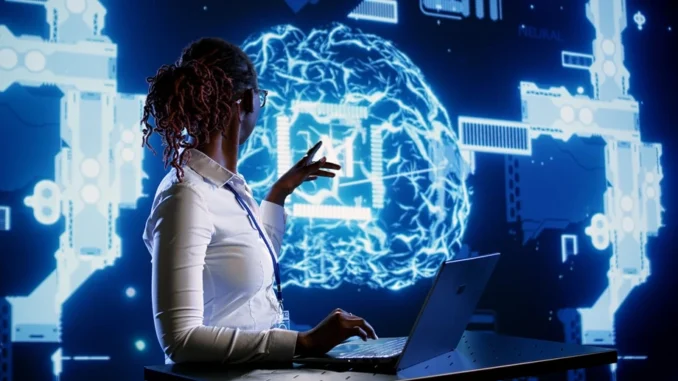
Artificial intelligence (AI) technologies have significantly impacted various aspects of society, business, healthcare, education, and everyday life. Below are some key areas where AI has made a substantial impact:
### 1. **Healthcare**- **Diagnostics**: AI algorithms analyze medical images (e.g., X-rays, MRIs) and assist in diagnosing diseases with high accuracy, sometimes surpassing human radiologists.










– **Personalized Medicine**: AI can analyze genetic information and patient data to tailor treatment plans based on individual patient profiles.
– **Drug Discovery**: AI accelerates the drug discovery process by predicting molecular interactions and identifying potential drug candidates more efficiently.
– **Patient Management**: AI-powered chatbots and virtual health assistants provide patients with medical advice, appointment scheduling, and follow-up reminders.
### 2. **Business and Finance**
– **Customer Service**: AI chatbots handle customer inquiries and provide support, improving response times and customer satisfaction.
– **Fraud Detection**: AI systems analyze transaction patterns to identify fraudulent activities in real-time, reducing financial losses.
– **Risk Assessment**: In finance, AI can evaluate credit risks and provide insights for investment decisions by analyzing vast amounts of financial data.
– **Predictive Analytics**: Businesses use AI to forecast sales, customer preferences, and market trends, enabling more effective decision-making.
### 3. **Education**
– **Personalized Learning**: AI-powered platforms adapt educational content to meet the individual needs and learning speeds of students.
– **Intelligent Tutoring Systems**: AI provides interactive learning experiences and real-time feedback, helping students grasp complex subjects.
– **Administrative Efficiency**: AI automates administrative tasks such as grading and enrollment, allowing educators to focus more on teaching.
### 4. **Transportation and Autonomous Vehicles**
– **Traffic Management**: AI optimizes traffic flow in cities, reducing congestion and travel time through smart traffic signals and routing suggestions.
– **Self-Driving Cars**: AI drives the development of autonomous vehicles, aiming for safer and more efficient transportation systems.
– **Fleet Management**: Companies use AI to manage logistics, optimizing routes and reducing fuel consumption.
### 5. **Retail**
– **Inventory Management**: AI predicts inventory needs based on historical data and trends, helping businesses maintain optimal stock levels.
– **Personalized Marketing**: AI analyzes customer data to tailor marketing campaigns and product recommendations, increasing engagement and sales.
– **Customer Experience**: Virtual assistants and AI chatbots enhance the shopping experience through instant assistance and personalized service.
### 6. **Manufacturing**
– **Predictive Maintenance**: AI analyzes machine performance data to predict failures before they occur, minimizing downtime and maintenance costs.
– **Quality Control**: AI systems inspect products in real-time, identifying defects and ensuring quality standards are met.
– **Supply Chain Optimization**: AI optimizes supply chain operations by forecasting demand and managing resources more effectively.
### 7. **Creative Industries**
– **Content Creation**: AI tools assist in generating articles, music, art, and videos, changing the landscape of creative work.
– **Enhanced Editing**: AI technologies improve photo and video editing, offering users tools for automated enhancements and suggestions.
### 8. **Security and Surveillance**
– **Threat Detection**: AI enhances cybersecurity by identifying patterns indicative of security threats and responding to them in real-time.
– **Facial Recognition**: AI is used in surveillance systems for identity verification and security monitoring, although this raises ethical concerns regarding privacy.
### 9. **Social Interaction**
– **Social Media**: AI algorithms curate content, recommend friends, and enhance user experiences on platforms like Facebook, Instagram, and Twitter.
– **Content Moderation**: AI assists in moderating content by identifying harmful or inappropriate posts, helping maintain community standards.
### 10. **Job Market and Workforce**
– **Automation of Routine Tasks**: While AI enhances efficiency, it also raises concerns about job displacement in sectors like manufacturing, customer service, and data entry.
– **New Job Creation**: AI technology also creates new roles related to AI development, maintenance, ethics, and monitoring, prompting a shift in workforce skills.
### 11. **Ethical Considerations and Social Impacts**
– **Bias and Fairness**: AI systems can reflect and perpetuate societal biases, raising concerns about fairness and equitable treatment in areas like hiring, law enforcement, and lending.
– **Privacy Concerns**: The use of AI in data collection and analysis can lead to significant privacy issues, necessitating robust guidelines and regulations to protect individuals’ data.
### Conclusion
The impact of AI technologies is extensive and multifaceted, reshaping industries, enhancing services, and influencing daily life. While AI presents significant opportunities for innovation and efficiency, it also comes with ethical challenges and concerns that require careful consideration and proactive management. Understanding these impacts is essential for navigating the future landscape of AI and its integration into various aspects of society.

Leave a Reply